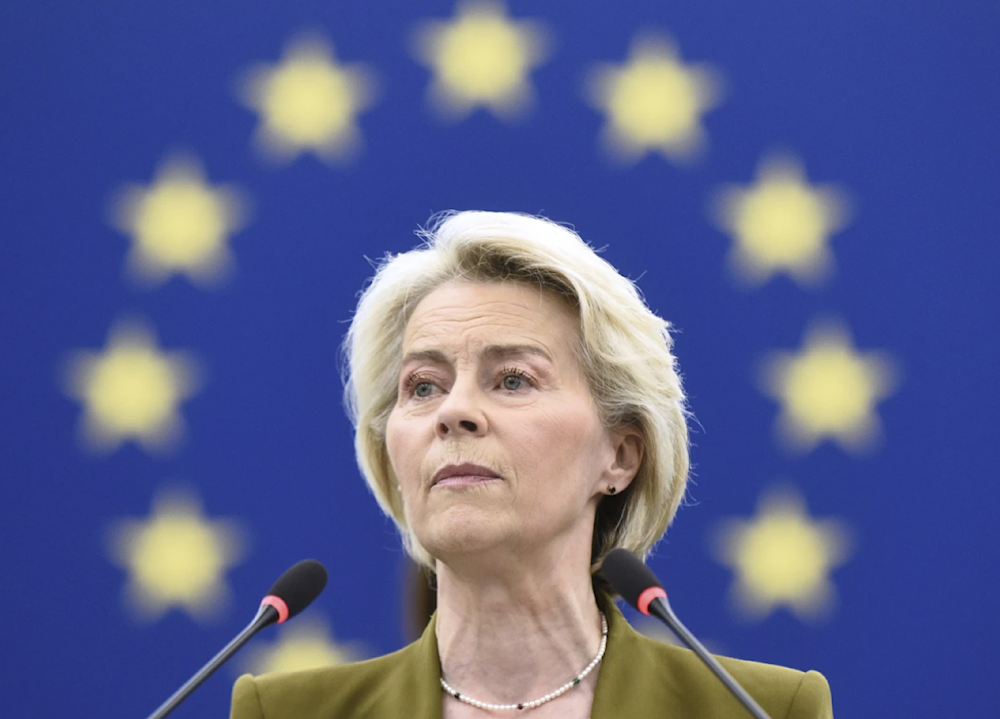How Europe is undermining Ukraine war negotiations: RS
European plans for postwar troop deployments in Ukraine may be undermining negotiations with Russia, risking a prolonged war and deeper regional instability.
-

European Commission President Ursula von der Leyen delivers a major state of the union speech at the European Parliament in Strasbourg, eastern France, on September 10, 2025 (AP)
Following last week’s Paris meeting of the so-called “coalition of the willing,” 26 countries reportedly agreed to contribute to a military force that would be deployed in Ukraine, but only after the war ends. While framed as a "stabilizing measure" for the postwar period, the move raises urgent questions about whether European powers are unintentionally, or perhaps deliberately, complicating the prospects for a negotiated settlement to the Ukraine war.
Just weeks earlier, during a press conference at the Anchorage leaders’ summit, Russian President Vladimir Putin reiterated that any peace agreement must include provisions for Ukraine’s security. However, Russian officials have made it clear that this security cannot involve the presence of Western combat forces on Ukrainian territory. In response to the coalition's postwar troop proposal, Putin declared that such deployments would be considered "legitimate targets" by the Russian military, a stark warning with serious implications.
Russia’s red lines vs. Europe’s strategic calculations
European leaders continue to pursue plans that could potentially bring them into direct confrontation with Russia, the country with the largest nuclear weapons arsenal. One explanation may lie in shifting perceptions of Russia’s deterrent posture. Early in the war, Putin’s nuclear signaling had a chilling effect on Western involvement.
Additionally, Europe’s approach appears to be anchored in long-standing principles established after the Cold War. As recently emphasized by NATO Secretary General Mark Rutte, Western nations argue that Russia has no right to veto Ukraine’s sovereign decisions, including accepting foreign troops. This stance is grounded in the Charter of Paris, which affirms the right of states to choose their own security arrangements freely.
Yet this principle-based approach omits a key element of that same charter, the concept of indivisible security, which asserts that no nation should enhance its security at the expense of another’s. While the West defends Kiev’s “right to choose,” it downplays the fact that NATO enlargement, including the proposed troop presence, directly impacts Russia’s sense of security.
Why postwar troop plans could backfire
Despite suggestions that foreign forces would only enter Ukraine after the war ends, the mere announcement of such intentions could influence Russian decision-making today. If Moscow believes that the presence of Western troops is inevitable once a ceasefire is reached, it may conclude that prolonging the war is the only way to prevent this outcome.
Rather than serving as a bargaining chip in negotiations, insisting on a postwar Western military presence in Ukraine may harden Russia’s resolve. The result could be a longer, bloodier conflict, driven by a strategic miscalculation on Europe’s part. In this light, European calls for a ceasefire, when coupled with such plans, appear increasingly disingenuous.
Is Europe sincere about a ceasefire?
The shift in European rhetoric toward supporting a ceasefire did not occur until US President Donald Trump pressured Ukrainian President Volodymyr Zelensky to accept a 30-day unconditional truce. Once the US took the lead, Europe followed, largely due to its dependency on Washington for security.
However, since Russia has made clear it will not agree to a ceasefire without achieving its political goals, European support for an unconditional ceasefire serves a secondary function: portraying Moscow as the main obstacle to peace. While not an unfair characterization, the tactic suggests that European priorities may lie elsewhere.
Further undermining the credibility of Europe’s peace narrative is its continued emphasis on imposing new sanctions against Russia, without offering any pathway to sanctions relief as a negotiating incentive. Such an approach weakens the West’s leverage at the bargaining table.
Risky gamble for European stability
The insistence on a hardline postwar strategy, from troop deployments to sanctions, reflects a deeper belief among Europe’s political class: that a so-called “bad deal” would be worse than the war continuing. Some may believe that Ukraine can hold the front long enough for Russia to falter under the weight of military losses and economic decline.
Others may be more concerned with avoiding the appearance of weakness. From this perspective, even a Russian breakthrough could serve Western interests by uniting European governments and populations behind increased defense spending. The assumption is that even if Russia gains territory, it will be unable to control a resistant Ukrainian population.
But this logic carries significant risks. The recently announced memorandum of understanding on the Power of Siberia 2 pipeline underscores the long-term consequences of Europe’s rupture with Russia. If completed, the pipeline will shift energy flows toward China, locking in Russia’s economic pivot to Asia and diminishing Europe’s strategic influence.
Choosing between escalation, engagement
Russia will remain an adversary of the collective West for the foreseeable future. But if Europe is to navigate a multipolar world effectively, it must leave open channels for engagement, even with rivals. Insisting on rigid military alignments and zero-sum outcomes may not only prolong the war in Ukraine but also destabilize the broader international order.
While defending principles is important, preserving space for diplomacy is essential. Posturing for postwar troop deployments may score short-term political points, but it risks sabotaging the very negotiations that could bring this devastating conflict to an end.

 5 Min Read
5 Min Read









